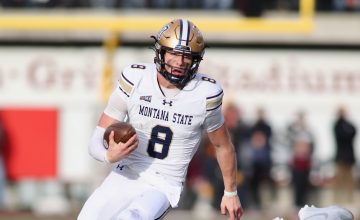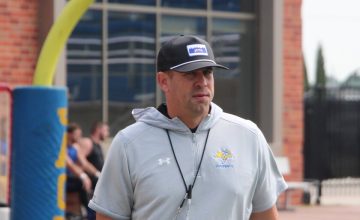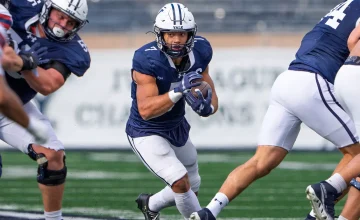BOZEMAN, Montana — Melstone is not the smallest town in the state of Montana.
But it’s close.
The listed population of the tiny municipality located on the northside of the Musselshell River valley in eastern Musselshell County on U.S. Highway 12 is 126. That means there’s 10 towns — (in order from biggest to smallest) Dodson, Judith Gap, Grass Range, Bearcreek, Outlook, Rexford, Opheim, Flaxville, Neihart & Ismay — which have smaller listed populations than Melstone.
Perhaps the easiest way to explain it is this: Melstone has never had its own football team. There is no football field in Melstone, Montana. At times, Melstone had a co-op with other high schools in the area and at other times, there was no football.
NFL prospects aren’t supposed to come from towns this small. Sure, Montana small towns like Chester, Drummond and Zurich have produced future pros over the years. But if you want to know how small Melstone, Montana really is, just tell Brody Grebe that the suggested population is 126 residents.
“There’s no way there’s 126 people who live in town. Sure, maybe around the area, around the town, but I bet it’s half that,” the blonde-haired, blue-eyed, non-nonsense Melstone Cowboy said at the Big Sky Kickoff media day in July.
Grebe is not the letterman at Montana State from the smallest town. That distinction goes to Ed Arnold of Rexford, which was probably around 300 people when he played for MSU in 1940 but that now has 78 folks in the official population.
Arnold Bergland of Grass Range (Population: 206 when he lettered in 1938, but 110 now) is next. A pair from Dodson – Jim Norland in 1950 and Joe Nicholson from 1962-1964 — hailed from a town that was between 315 and 330 people back then that now boasts 125.
Grebe had the opportunity to be teammates with Treyton Pickering, who hails from the booming Northern Montana town of Sunburst, which currently boasts a population of 333, more than twice the size of Melstone.
So it’s safe to say that Grebe not only is from one of the smallest towns of anyone in the history of Montana State football but he’s also very likely the All-American in Division I college football from the smallest town of anyone in the entire country.

How does something like this happen? Is Grebe simply gifted? That would explain at least part of his size and athleticism. At 6-foot-2.5 and 250 pounds with a rumored 40-inch vertical, he is one of Montana State’s most explosive players. Many around the MSU program expect the defensive end to test like former Bobcat defensive end Daniel Hardy did on his pro day. And that performance got Hardy drafted.
Certainly, the work ethic Jason Grebe instilled in both his sons — Brody’s younger brother, Bryce, is a standout redshirt freshman inside linebacker on the No. 1-ranked Bobcats — honed helping dad work a ranch with more than 1,000 head of cattle but with no hired hands is important.
And certainly, Grebe’s intellect combined with his distinct belief in himself have helped him reach this point. Yet when you put his career into perspective, that perspective is stunning.
All he’s done throughout high school and college is achieve and win.
“Those smaller school athletes, they get thrown under the rug a little bit,” Montana State senior captain Tommy Mellott, a native of Butte, said. “You always hear these scores like 100-3 in basketball or 80-0 in football and you are like, ‘Oh yeah, this one kid just runs around all these little 5-foot-2 kids that don’t really want to be out there but their parents make them so the other kids could have a team.’ That’s what you always assume when you see those crazy Class C scores. So those guys always have something to prove.
“And Brody has proven it, and then some.”

Earlier this month, Grebe had a chance to attend the National Football Foundation awards, where he was one of 16 finalists for the William V. Campbell Trophy, which is the equivalent of the academic Heisman Trophy. Over the last two weeks, the All-American honors are piling up.
Simply put, Grebe is one of the best defensive linemen in the United States and one of the most decorated in MSU history. Even if he doesn’t have gaudy statistics, he has the utmost respect from fellow coaches and players. That’s what makes him a true NFL prospect and a three-time All-American.
“Just watch how physical he is,” Montana State defensive coordinator Bobby Daly said. “Man, watch how he’s able to throw around 300-plus pound men like rag dolls and ultimately the effort he plays with. That’s what they want in the NFL. Can you get to the quarterback? That’s a big part of it. But can you wreak havoc and set the edge and allow other players to play freely?
“Brody plays with supreme, one-of-a-kind effort. And when you have one guy like that who plays with that type of effort, it’s contagious for our entire group up front and our entire defense.”
Grebe has already secured a spot as one of Montana State’s most decorated defensive lineman, a lofty achievement considering MSU has had 30 All-American players along their defensive front during their 61-year history in the Big Sky. The list includes names like Bill Kollar and Les Leininger from the Sonny Holland Era, future NFL starters like Corey Widmer in the early 1990s and Dane Fletcher in the late 2000s. And of course, a pair of Buck Buchanan Award winners with Treasure State roots in Caleb Schreibeis of Billings (2012) and Brad Daly of Helena (2013), who Grebe grew up idolizing.
Grebe landed on the AP All-American team for the third time, making him just the second Bobcat ever to earn All-American honors three years in a row. Only legendary safety Kane Ioane has more All-American nods with four between 2000 and 2003.
The “Melstone Cowboy” became the ninth Bobcat to earn Big Sky Conference Defensive Player of the Year honors, including the fourth defensive lineman to secure the prestigious nod. He is the first Class C player to win one of the Big Sky’s headlining awards and the first Class C alum to earn All-American honors since Les Leininger did it back in 1976.

Today, it’s hard to remember a time when he wasn’t one of the faces of football, and the Western lifestyle, around the state of Montana. Grebe proudly sports a black cowboy hat whenever he can. He wore it to media day in Spokane last summer and he wears it on road trips.
When Grebe gets a sack, he celebrates with a rendition of world-class team roping heeler Junior Nogueira when he lassos a steer, an homage to his roots in one of Montana’s tiniest towns and a nod to the rodeoing he did growing up that helped mold character, toughness and the independent attitude that defines his persona.
In a moment in time when so many wannabe cowboys are prowling the streets of Bozeman, Grebe is the realest cowboy, a kid from a one-man ranch in one of the smallest towns in America.
“There’s a lot of people who wear the cowboy hat and the tight, skinny jeans over the boots these days aren’t cowboys,” MSU senior captain Rylan Ortt said in August. “ But I think being a cowboy and the cowboy mentality is how you carry yourself, how you act. It’s more than what you wear. It’s about being a good person, working hard and caring about something more than yourself and Brody encompasses that.”
Grebe is not just a try-hard who helps eliminate excuses by his existence, however. He’s a bull in a China shop, a disruptor off the edge with a well-earned reputation as one of the premier defensive linemen in the country. Other than that celebratory ode to the ranch he grew up on and the lifestyle he still loves, watching Grebe on Saturdays does not come with some small-town, underdog narrative.
“Everything starts and ends with No. 41,” Portland State head coach Bruce Barnum said earlier this season. “He’s one tough SOB, a cowboy, probably spitting tobacco while he’s lifting weights. And he’s a mean dude on the field. He sets the tone for that entire defense the way that he plays.”

Montana State head coach Brent Vigen said earlier this week that Grebe has “established a reputation as an all-time great in this program, there’s no doubt in my mind.”
Daly, a former MSU All-American who’s in his first year as the defensive coordinator at his alma mater, also compares the explosive defensive end with a relentless motor to Hardy, an NFL Draft pick by the Los Angeles Rams in 2022 and a current member of the Chicago Bears.
Former Montana State head coach Jeff Choate plucked Grebe from, coincidentally, Choate Rosemary School, a prep academy in Connecticut after just a semester of Grebe betting on himself. That signing day, Choate boldly compared Grebe’s diverse athleticism to that of Troy Andersen, a former second round NFL Draft pick who, when healthy, is the starting inside linebacker for the Atlanta Falcons. Choate enthusiastically pointed to Grebe’s diverse athleticism honed playing four sports along with a work ethic built from his rural upbringing and rural roots, is similar to Andersen, a three-sport star at Beaverhead County High who grew up on a ranch outside of Dillon.
“We had 40 kids in our high school and it influenced me and Brody in a way that is all about hard work,” Bryce Grebe said. “My dad doesn’t even have a hired hand and has close to 1,000 cows. When me and Brody were home, we were working. That’s really helped us know what hard work is and how to work.”
Grebe, like Andersen, has also been a proud representative of Montana State’s legacy No. 41 jersey. He’s the latest in a burgeoning tradition of native Montanans to wear the number that gives homage to Montana being the 41st state to join the Union as well as to the 1941 Bobcat squad that lost more than a dozen players who died in World War II.
“Brody represents everything that number does, and he’s so genuine in every way,” Vigen said. “You want the number to be a guy who represents the idea of a guy from Montana making his way, but I think in so many ways, what else could Brody do to represent that number? He exemplifies everything that puts him in that position to be that number. He is Montana.”
Although the population numbers in Class C high schools are sparse, the sheer number of schools are many. More than 100 of Montana’s 182 high schools are Class C.
Grebe is certainly one of the most decorated players from Class C in the history of the Bobcat football program. His only Bobcat peer is Leininger, a first-team All-American defensive lineman from Westby during the Sonny Holland era.
After earning Defensive MVP honors of the 1976 national title game, Leininger was asked by Dave Dials of ABC what it was like to play small-town, eight-man football along the North Dakota border. Leininger replied honestly.
“They give you the ball,” he said on national television, “and you run your ass off.”
That’s exactly what Chase Reynolds did during his peerless prep career in Drummond in the mid-2000s. He finished his prep career as the Treasure State’s all-time prep rushing king and the leading rusher in the history of the University of Montana. He went on to play for six seasons in the NFL.
For Grebe, it wasn’t as simple even if his raw talent was superior to almost every Class C kid who came before him. He was 6-foot-3 and over 200 pounds when he was a junior in high school. And his exploits playing for his father since he was an eighth grader for the Melstone basketball team had him wondering what he might pursue following his prep career.
Throw in that Grebe is one of the finest small-school track athletes in the history of the state of Montana… and that he probably could have pursued rodeo at a very high level meant Grebe had a choice to make.
Once he made the choice to pursue football back in his home state, he almost instantly started making an impact, rolling up 5.5 sacks as a freshman on MSU’s 2021 national runner-up squad.
“The thing I remember most early on was just his relentless effort to the quarterback and to the ball carrier,” Daly said. “His motor was unmatched. His technique was not as refined as it is now, but you knew you were going to get his 110 percent on every snap he was in on the football field.”
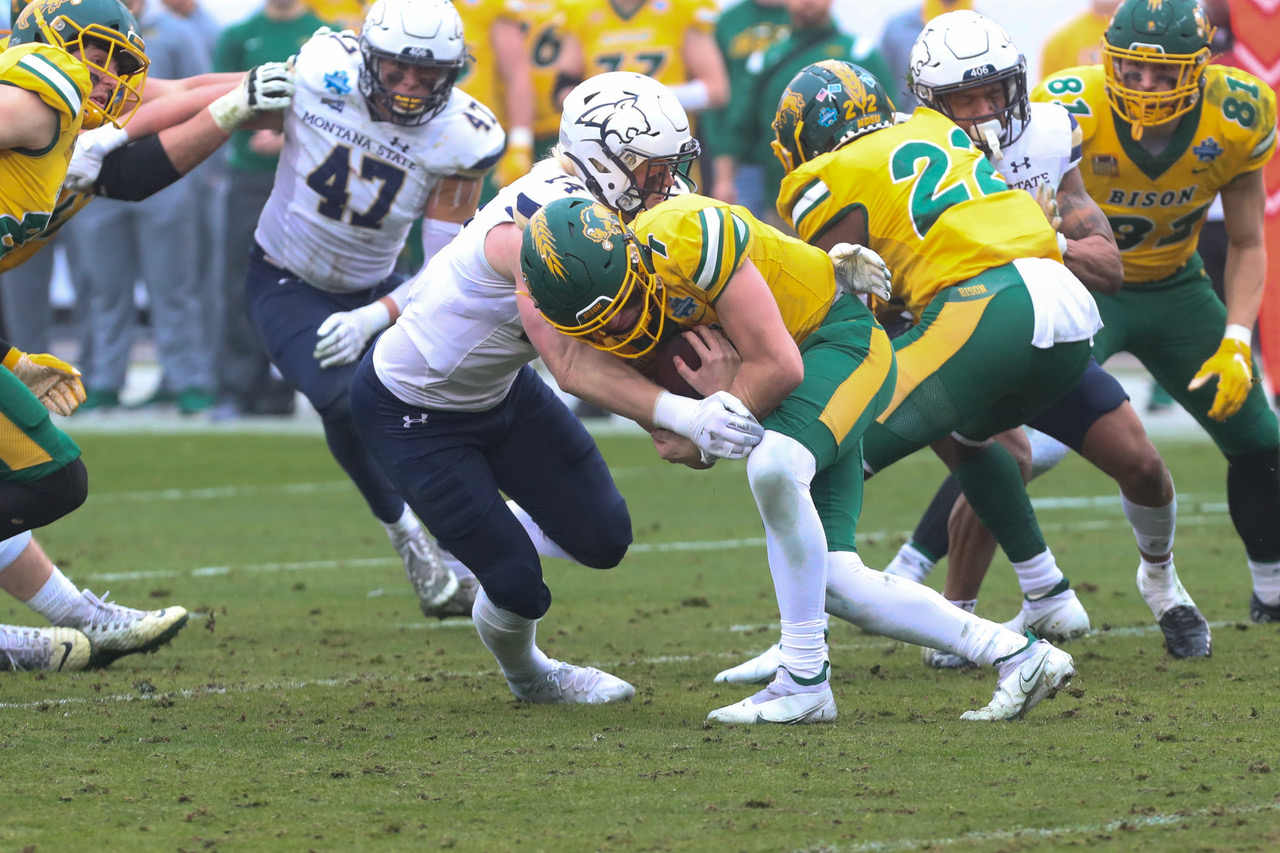
Since that impact first season, Grebe has been a stalwart, starting 35 games and serving as one of the most consistent collegiate defensive line presences in West. He enters Saturday’s national semifinal with 25.5 sacks and 34 tackles for loss in his career.
“He’s obsessed with getting the work in,” MSU defensive line coach and co-defensive coordinator Shawn Howe said earlier this week. “Rather than obsess about getting doubled or all the extra attention, he obsesses about how to get around all of that. He dives into his solution more than the problem, and that’s true with everything in his life.
“He’s gone from a really hard working kid to a well-invested man who’s obsessed with all the details of the game and that’s what makes him elite.”
Other than his freakish athleticism, sharp football IQ and his rural-influenced work ethic, the thing that sets Grebe apart, is that none of this surprises him. Pretty much nothing seems to surprise the mature, intelligent, and irreverent Montana State captain. And for anyone who’s watched him since early on, it’s no surprise to them either.
“When I first got to Montana State in 2019, and he was a senior in high school, Brody’s name was in our building,” Daly said. “Coach Choate and the staff had been talking about him. We had offered Brody a partial scholarship coming out of high school, but he wanted a full. He elected to bet on himself.”
What does it really mean to be a Class C kid trying to make it at the Division I ranks? And what about the NFL?
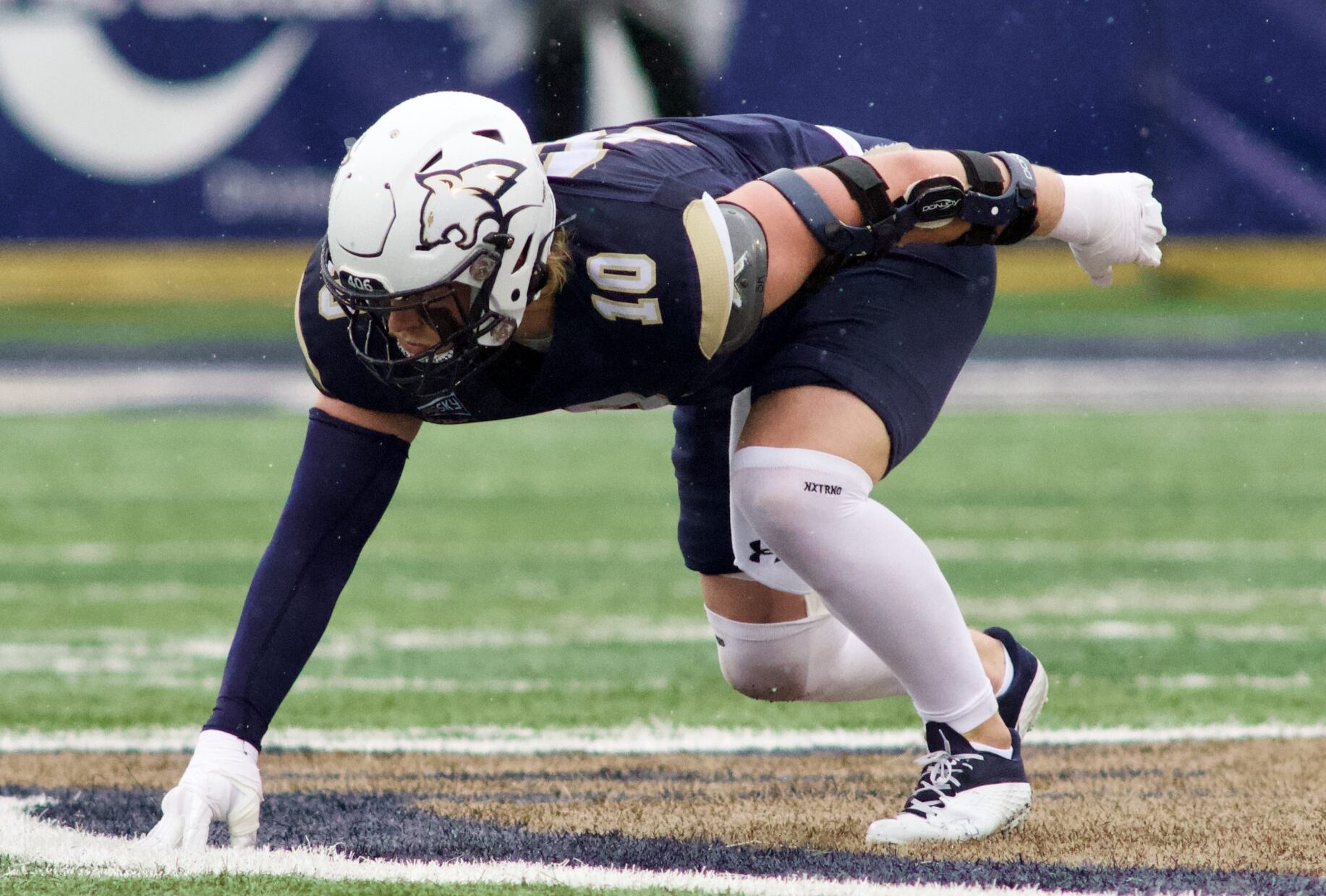
For some, like twin brothers Kruiz and Kazz Siewing, it meant driving from Saco (population: 159) to the urban epicenter of Malta (1,860 residents) in order to play 11-man football in high school before making their way at Montana State as non-preferred walk-ons who made the team basically by trying out.
For others, like Casey Fitzsimmons of Chester (population: 847), it meant going to Carroll College of the NAIA before getting an opportunity to play in the National Football League.
Even kids who prep in Class AA have an almost mandatory chip on their shoulders. Just ask McCade O’Reilly, Montana State’s first-team All-Big Sky inside linebacker who hails from Bozeman. Or Ortt, a team captain and first-team all-conference safety from Missoula who had to walk on to Montana State six years ago. Or even Mellott, Montana State’s All-American quarterback from Butte who’s rewriting the MSU record books during his senior season. All of them played Class AA, yet they still harbor the trademark “us against the world” mentality.
“The baseline is the baseline. They have to be good enough athletically to play,” Montana head coach Bobby Hauck said at the Big Sky Kickoff when asked what the entry point was for Class B and Class C players to the Division I ranks in Montana. “I think that one thing I like about the Montana kids, especially the kids from 6-man, eight-man and the in the smaller 11-man schools, is if they’re athletic enough, they’ve got such a huge upside. They’re multi-sport athletes for the most part. So they’ve got skill that they’ve learned from other sports.
“And then as they learn the game of football, they have a really steep learning curve, but they really can achieve. Once they start playing, it’s fun to see.”
For Grebe, it meant driving 35 miles to and from Roundup from his hometown every day during football season to play 11-man Class B ball because Melstone didn’t have a team, so the few that wanted to play during his high school career had to have a co-op.
Then it meant managing the demands of basketball, track and rodeo, all while maintaining a perfect GPA and all his daily chores on the family ranch.
When the full ride scholarships that Grebe knew he deserved did not come, it then meant moving to the other side of the country more than 2,000 miles away to attend Choate Rosemary in Wallingford, Connecticut for a post-grad year to affirm his love of football and earn the opportunity he coveted.
“Whether you come from a small town or not, you have to be able to see it,” Vigen said. “You have to be able to see the path to success. You have to believe that it will happen.
“And I think so many don’t view it that way. They have obstacles. They don’t think they can do things. They don’t think the competition they played was good enough, that’s going to limit them, that is going to hold them back.
“But Brody never believed that. He has always believed in his ability and he’s maximized his ability.”

Grebe has always been different. When he ventured East, he already had partial scholarship offers from both Montana and Montana State under his belt. He just wanted to see if he could go bigger and earn more.
He wanted to see if the Ivy League would come calling. There wasn’t a notion that he needed to prove he could play Division I sports. There was a calling to challenge himself at the highest level possible, which has been a trend throughout Grebe’s life.
Although few people knew it when his journey beyond Montana’s borders first began, particularly compared to the large number of people that understand that reality now, Grebe has long been one of Montana’s most sure-fire next-level football prospects. But the Class C moniker is one that’s hard to shake, even for one of the Treasure State’s best multi-sport athletes of the 21st century.
“Coming from a small school and a tiny town, having people tell you your whole life that you’re not good enough, you need to play against better competition, that’s fine with me,” Grebe said in July. “That gives me a greater meaning and purpose and a drive to go do what’s not expected of me.”
Before venturing East to Choate Prep, Grebe earned plenty of attention for his impressive accomplishments. On the football field playing for the Roundup High School Panthers as a senior, he rushed for 1,441 yards and 31 touchdowns offensively and was named the USA Today Defensive Player of the Year for Class B.

During basketball season the winter of his senior year, Grebe entered Montana’s vaunted 2,000-point club with a 32-point performance in a 79-9 win for the Melstone High School Broncs over the Terry High School Terriers in January of 2019. He ended up scoring 755 points that year, the ninth-most in the state’s celebrated basketball history. He finished his career with 2,540 points, behind only Highwood High School Mountaineers ace Reece Gilko (2,763 points from 1990-1993) in career scoring.
That hoops prowess helped the exploratory journey to the East Coast become a reality — he went to Choate on a basketball scholarship — but not before Grebe really made coaches think.
National Signing Day comes the first Wednesday of every February. It came and went in 2019 while Grebe was in the midst of his senior year of hoops.
At the Class C state track meet in May, Grebe had a performance for the ages. He won the 200 meters (22.82 seconds), the shot put (51 feet, 7 inches), the long jump (21 feet, 8.5 inches) and the triple jump (45 feet, 6.75 inches. He also ran 11.15 seconds in the 100 meters at 215 pounds, placing second and making the comparisons to Andersen — who ran 10.79 in the 100 as a high schooler — more real. Grebe’s shot put, triple jump and 200 meter marks were among the best in the state, all classifications.
That performance did help him earn the 406 MT Sports Male Athlete of the Year award for the state of Montana.
Had those track numbers come when he was a junior, Grebe probably would’ve gotten offered full rides from most of the Division I college football programs West of the Mississippi. Without those in hand, and because of his innate self-belief, Grebe moved to Connecticut.

At Choate Prep, Grebe thrived as a Wildcat quarterback, an edge end/outside linebacker and a stellar student.
His football profile exploded to the point that he had choices before hoops even rolled around. Who knows what sort of offers Grebe might’ve garnered after his one semester at Choate Prep had he stayed for basketball and track. He did well enough in football and in the classroom to earn full ride offers from Army, Navy, Air Force, UMass, Yale, Harvard, Dartmouth, Cornell, Montana and Montana State.
“That high academic achievement, so much credit goes to his parents, his upbringing, Melstone as a town,” Vigen said. “He learned at a young age you don’t do anything halfway and I know Jason not only being dad and mentor and rancher, but also his basketball coach, I’m sure that impression was significant. Brody got a chance to play varsity sports as an eighth grader, but it was expected that working hard is second nature.
“That’s maybe the case for some people, but excelling at everything, that’s complicated. You have to be intentional with how you go about your business. And the way he was raised had such an influence.
“Then he comes to Montana State, and you hope it manifests. You want the place, the football program, the university to allow all those skills to take hold and flourish while they are here. And fortunately, this is one of those significant stories of how this works.”
Then-Bobcat head coach Choate was compelling enough as a recruiter (one of his great strengths) and the promise of competing for a national championship were strong enough pulls for Grebe to return to Montana.

“That was the greatest change in my life I’ve ever experienced,” Grebe said of living in Connecticut in fall 2019. “Going from a town of 100 people, if that, to the East Coast, was definitely life changing. But those people treated with me with respect, and made me who I am, and gave me some experiences that I could take to Montana State and use for the rest of my life.
“Having the chip on my shoulder from being a small-town guy, being told that I’m not good enough, not good enough to get a full scholarship at Montana State, even coming out of high school, I needed that to prove I deserve that. I’m still proving that I want to be the best player in this conference, best player in this division, it motivates me every day.”
Grebe has carved out an undeniable legacy as one of the great smalltown football players in the history of the Montana State Bobcats and the history of the Treasure State through his steady, relentless nature and his peerless desire to be great. Yet he still has plenty left to prove.
“I’m a competitor. I love competition and I hate to lose,” Grebe said. “For me, especially when we lose — there’s only one team that gets to end on a win with a national championship — so ending with a loss, you have six, seven, eight months to think about that until the next season. And all I’ve been thinking about is our last losses, to end 2022 and 2023.
“For me, that’s what’s pushed me: knowing that I could play better, that we could play better, that I could change that game, that we CAN win that last game. What do we have to do to get to that level?”
His Bobcats sit on the brink of history. A win on Saturday against South Dakota would be the 15th straight during Grebe’s superb senior season.

Last week before MSU’s 52-19 demolition of No. 8 Idaho on national television, Grebe received the Montana state flag from Mark Fellows, an MSU Hall of Fame defensive end from Choteau (population 1,787) who led the country in sacks in 1984, the last time Montana State won the national championship.
That symbolic moment of the passing of the torch from one small-town Montana cowboy pass rusher from the past to the man who’s carrying the flag for all rural Montanans in the present was a sharp one. It could only be accentuated if Grebe can help lead the Bobcats to the promised land.
“We have a collection of seniors with the same vision and that’s when you become dangerous,” Grebe said. “Every single one of our leaders has a circle around them, watching them, looking up to them. When you have multiple guys who are cutthroat competitors, that spreads throughout a team.”
After that rookie season as a spot, splash player, Grebe rapidly evolved into one of the most fearsome defensive players in the conference. As a sophomore, the stats dipped — three sacks and six tackles for loss — yet the accolades kept coming.
He was voted unanimous first-team All-Big Sky as a sophomore for the Big Sky champions.
As a junior, Grebe had his best statistical season, helping elevate his NFL stock as well. He finished with 10 sacks and 14 tackles for loss. But that was secondary to what he really wanted.
““When we came in, we got thrown into that team that was loaded in 2021 and those guys were such great leaders and we went all the way to the national championship,” Grebe said. “We knew we needed to get back there and we knew we could. But how are we going to get back to the national championship and actually win it this time?
“We were hungry because we felt like shit after that (38-10 loss) because we know we didn’t play very well against North Dakota State, nowhere close to as well as we could’ve. We came back and we were hungrier, had a good year, went to the semifinals, got beat down.”
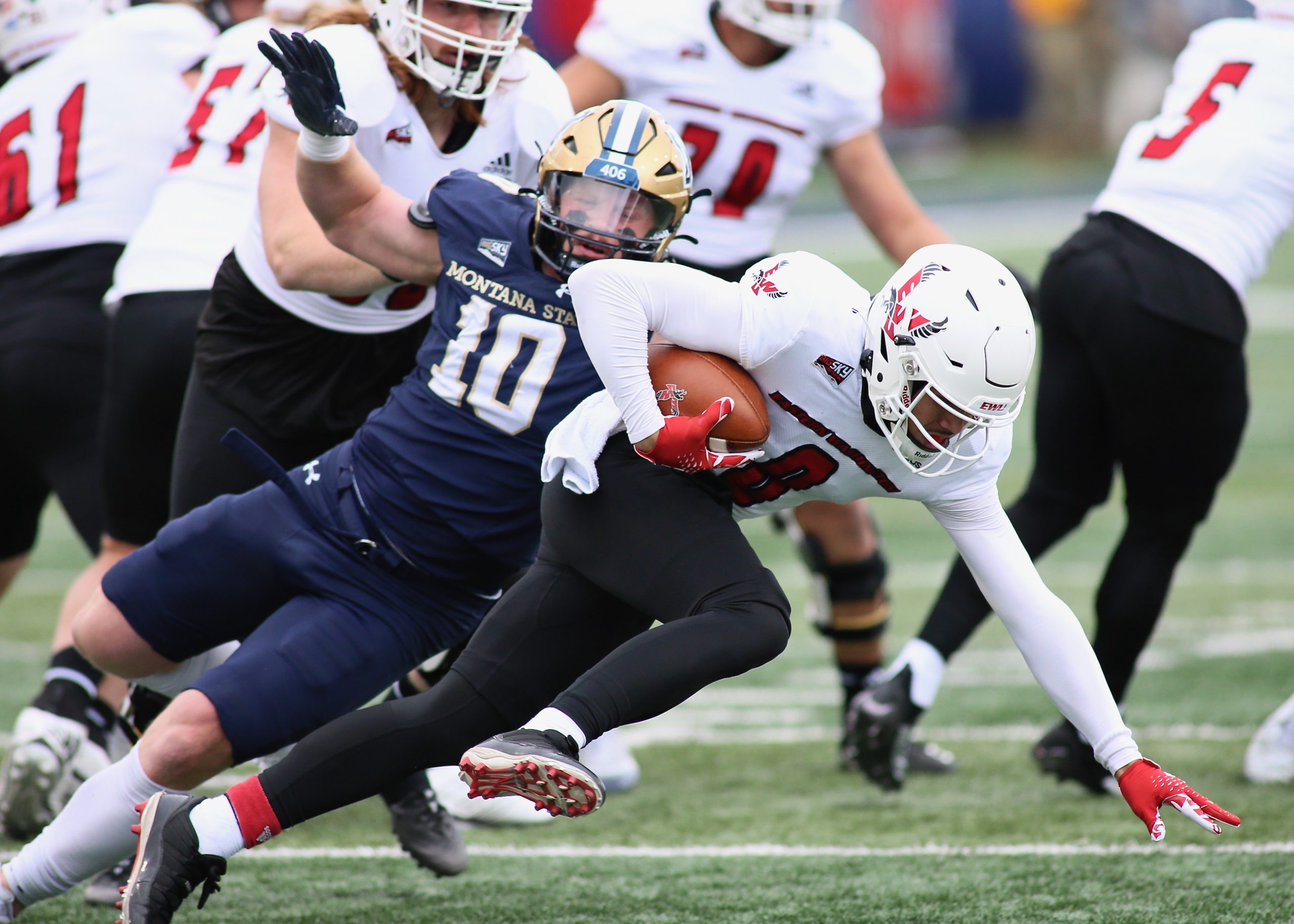
Last season was a nightmare from a team perspective for the Bobcats. MSU went toe-to-toe with South Dakota State in Brookings before eventually falling to the eventual national champions, 20-16. It looked like MSU might see the Jackrabbits again in the postseason. But then it all fell apart.
MSU lost at Idaho, then lost at Montana in the regular season. Montana State rallied to take perennially powerful North Dakota State down to the wire before a blocked extra point in overtime unmercifully ended the Bobcat football season with a fifth loss and an endless sea of what might have been.
“Last season, there was a turn in mentality that we didn’t necessarily see,” Grebe said. “We wanted to get better, get to that next step and last year, we lose at home in the playoffs, end our (28-game) home winning streak. That one hurt. That one hurt bad. We should’ve won that game.
“There was multiple reasons during last season for why, but we underperformed. I felt like as a team, we were just a mental roller-coaster. All of those things, the highs, the lows, the constant coming up short, that was honestly a slap in the face. After that, we knew we had to wake up. As a group of seniors, we came together, and we decided we weren’t going to let that happen again.”
That forced Grebe and his teammates to first self-reflect, then self-adjust, then attack every single day of the off-season into this pivotal senior season with a championship mentality.
Coaches both at Montana State and around the Big Sky think that Grebe will continue playing football after this season is over. Vigen said he thinks although his length “isn’t freaky”, he runs well enough and “probably has a 20-pound fluctuation for his weight depending on what teams want him at” either above or below the 250 pounds he carries now.
“If someone gives him a shot, he’ll have to grow on them, but I imagine whoever gives him a shot, he’ll grow on them quickly,” Vigen said. “I wouldn’t bet against Brody. I believe he will get a shot and I believe he will make the most of his opportunity.”
But before any of that, Grebe has unfinished business to take care of.
Grebe has been the vocal spokesperson for the narrative of the modern-day Bobcats. He was the first to say that MSU wanted to get back to Frisco to get another shot at NDSU, a team that ended Montana State’s seasons in 2018, 2019, 2021 and 2023.

He was the first to say that losing at South Dakota State in the 2022 semis redefined the level of physicality and physical strength it would require for MSU to win a national championship. He was the first to say that last year’s failures were exactly that and certainly not up to the standard Grebe and his teammates want to be held to.
At the Big Sky Kickoff in July, he was the first to say that it was a national championship or bust type of season for the Montana State Bobcats.
And all that culminates in this moment on Saturday in the ultimate finality for this group of Bobcat seniors. They play No. 4 South Dakota in their final game at Bobcat Stadium, win or lose, with another shot to Frisco on the line.
“Football teaches you so much about life in general,” Grebe said. “Being disciplined, the teamwork, being willing to say things that are hard to say and be honest to others when being honest isn’t the easiest things to do, all those different things are things I can take into the real world to help me navigate my future job or I’m trying to raise a family, trying to be the best dad I can be, I know that football teaches you so much about life and I’m so appreciative to have played this game.
“The things I remember the most are the wins and the time with my guys. The wins with my best friends and the memories with the guys who are my best friends, guys I’ll have in my wedding, guys who I hopefully spend a lot of time throughout the rest of my life with.
“Now we have to make one more memory. We have unfinished business to settle.”

/by Brooks Nuanez

/by Brooks Nuanez
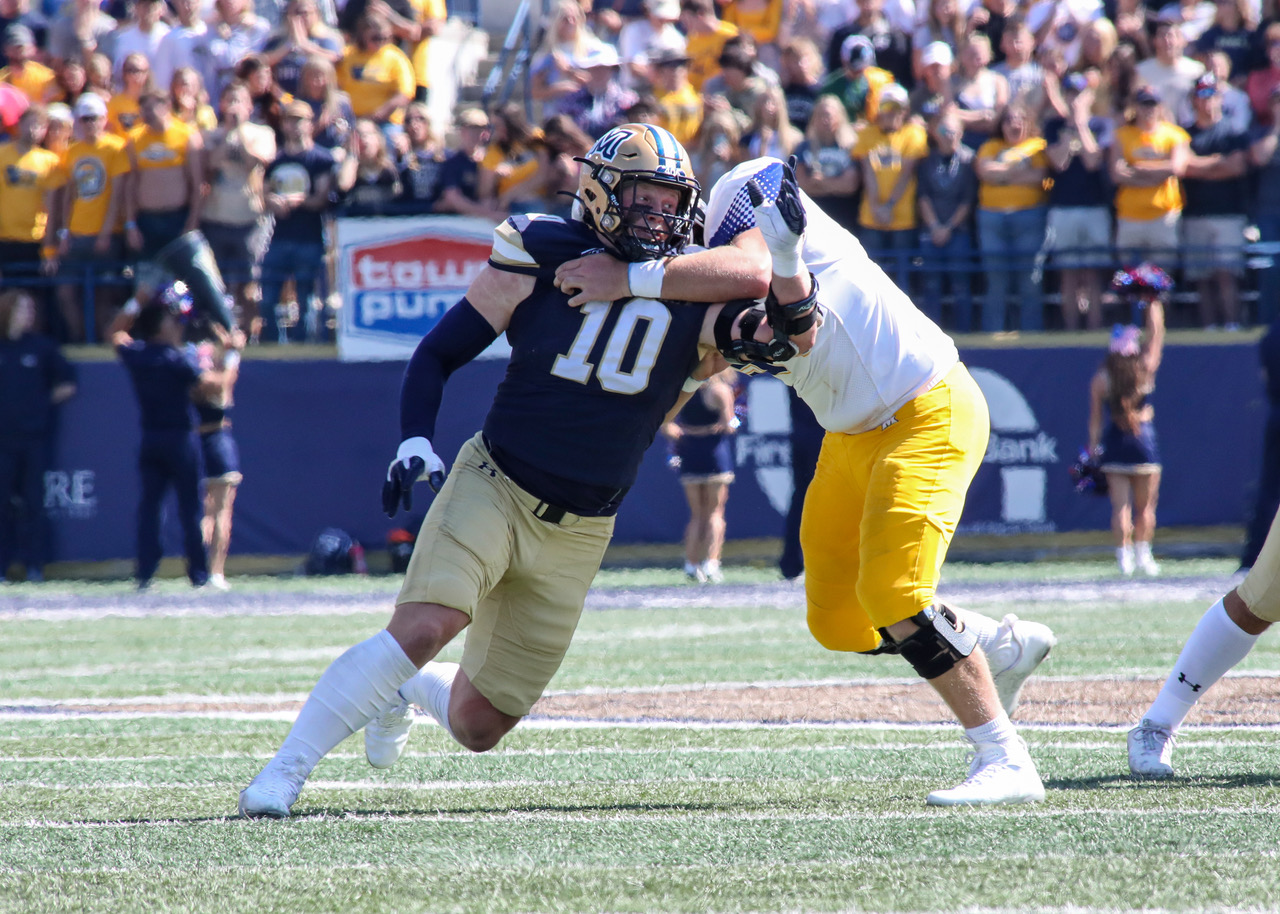
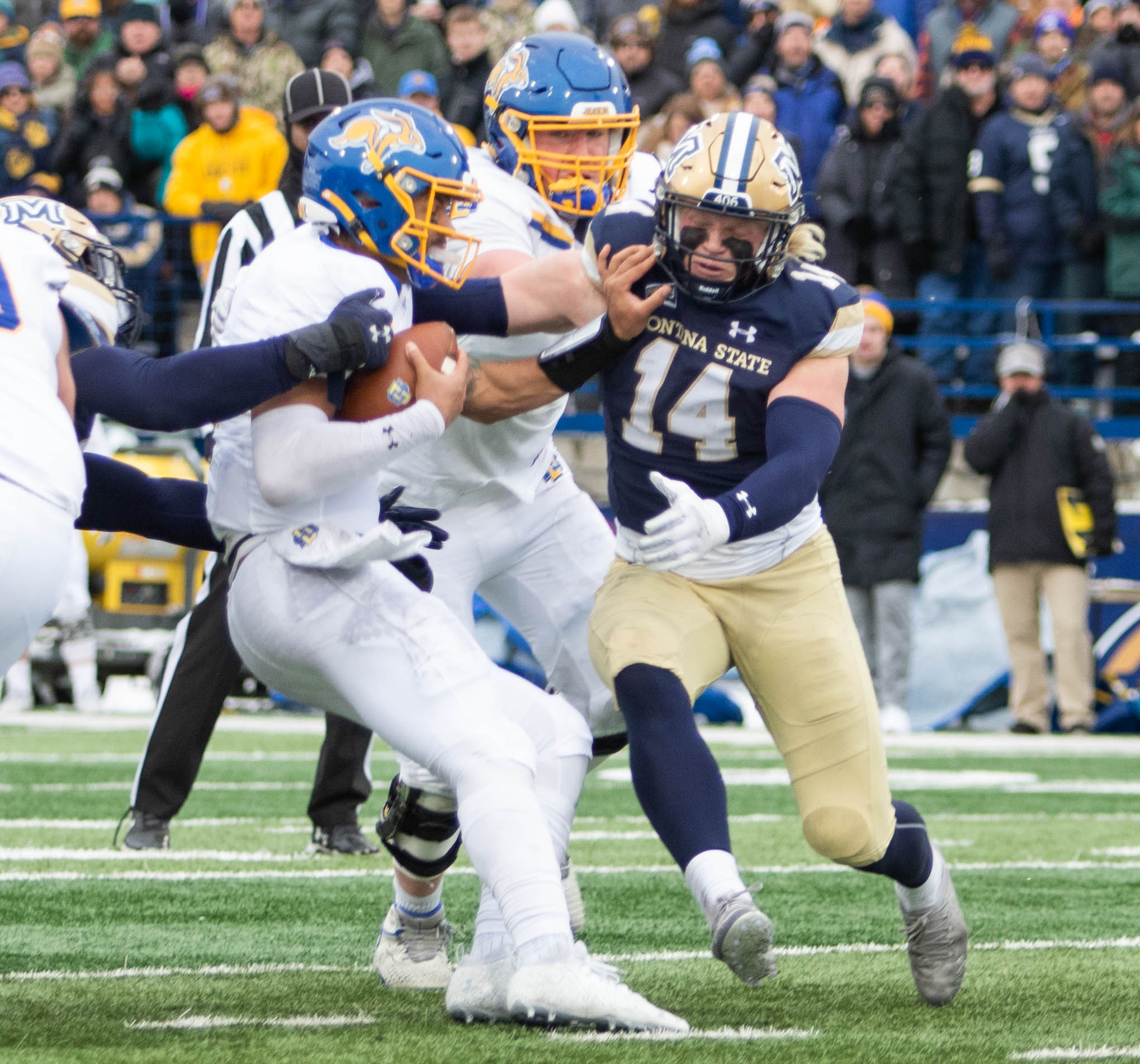
/by Jason Bacaj

/by Brooks Nuanez
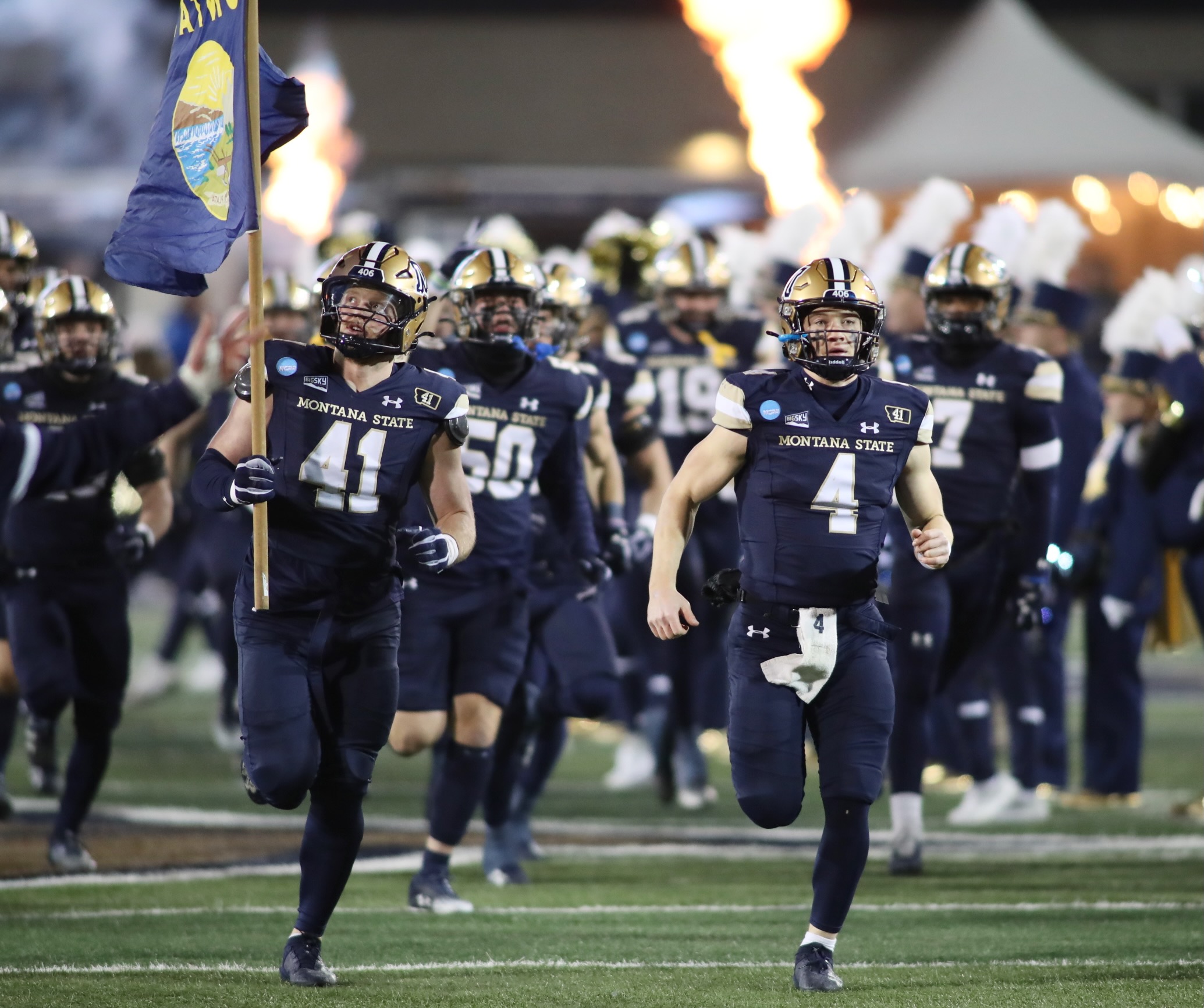
/by Brooks Nuanez


